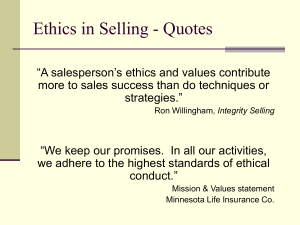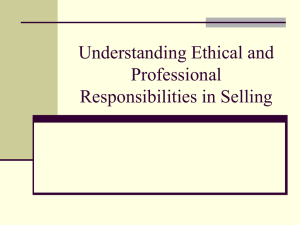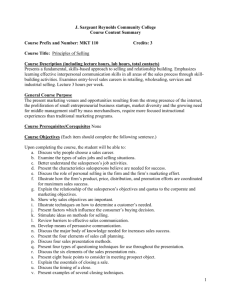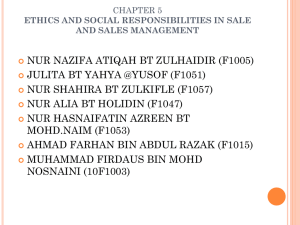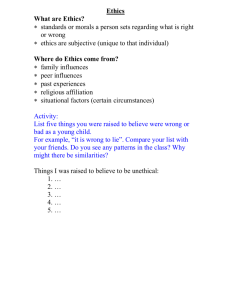Sales Ethics: It's Not An Oxymoron
advertisement
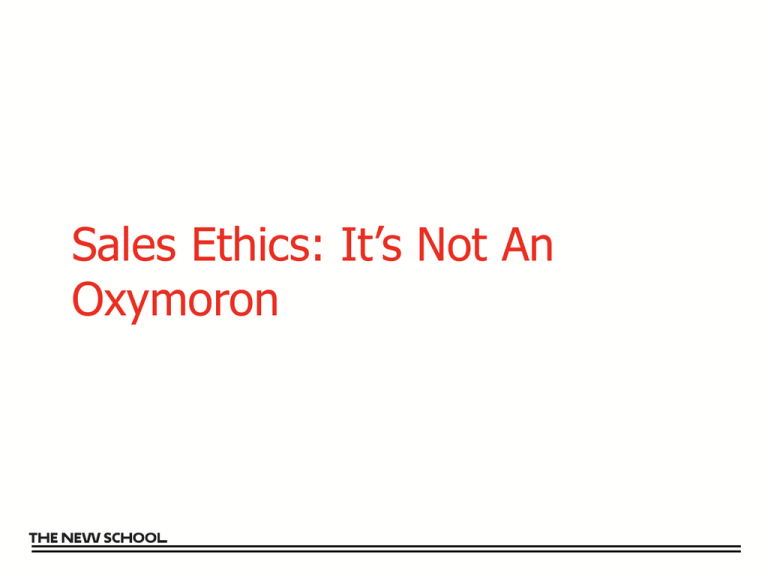
Sales Ethics: It’s Not An Oxymoron Corporations Today • Corporations, by charter, are immortal • Corporations have multiple relationships that they are unlikely to keep secret very long – www.sec.gov/edgar.shtml • Magnified for media companies, because revenue depends on: – Advertisers • Size of the audience – Subscribers Advertising • Large advertisers such as Verizon, P&G, GM, and Coca-Cola will be around for decades. • It’s not smart business to bite the hands that will feed your company for the next several decades. • Don’t lie to them or cheat them. – Customers don’t buy from people or companies they don’t trust. Current Headlines • The press loves stories about corporate dishonesty – Enron scandal – WorldCom – Ogilvy & Mather over-billing the government’s Office of National Drug Control – Bear Stearns hedge fund managers lying to investors – Goldman Sachs cheating customers What’s Going On? • Greed – Wrong incentives • People go along with unethical behavior because: – “No one will know.” – “If I don’t take their money someone else will.” Rationalization • Criminals and other sociopaths typically rationalize their behavior with the last one (“If I don’t take their money, someone else will.”) • A salesperson for a major media company forged a client’s name on a contract so revenue would be recognized, but got caught when the client got a bill and said, “We didn’t sign anything!” – “I won’t get caught.” Three Reasons • There are many reasons for unethical behavior, but three common ones are: – Strong tendency to bow to authority and follow orders: “Just following orders.” – Strong tendency to do what peer group does— social pressure and conformity: “Everyone does it.” – An absence of clearly defined and communicated standards: “Nobody told me.” • Bow to authority - Give up their individual free will and autonomy and turn their conscience over to someone else. - Won’t work – Nazis at Nuremburg trials. • Cave in to peer pressure in order to conform - Negate their free will and autonomy and hand over individuality to the crowd. - Won’t work – you have a conscience, the crowd doesn’t. • Absence of standards - Organizations must create and communicate ethical standards to trump the “nobody told me” copout. - Copout won’t work – we all know what we’re supposed to do. Why? • Sociopath, narcissist, excessive greed, or other personality defects? • Perhaps due to extreme pressure from management. • Perhaps because of an absence of clearly defined and communicated standards or a code of ethics. Ethics Vs. Morals • Ethics are clearly defined standards of right and wrong set out by written codes or standards set by an organization or profession. • Morals are individual standards of right and wrong based on: – Deep-seated personal values – Accepted beliefs and modes of conduct by groups in which people choose to work and play • Morals are related to personal character and belief as to what is right and wrong (internal). • Ethics are the proper behavior regarding the social system where morals are applied (external). Ethics • With heightened press coverage of business scandals… • The public has become increasingly concerned about ethical behavior… • Now, more than ever is the time to follow Peter Drucker’s sage advice… • “It is more important to do the right thing than to do things right.” Salesperson’s Five Areas of Ethical Responsibility 1. To consumers – Customers buy a product or service. – Consumers use a product – In some businesses (retail, utilities, transportation, e.g.) the customer and the consumer are the same – In other businesses (CPG, media, e.g.) they are different • Audience/readers/subscribers = consumers • Advertisers = customers Salesperson’s Five Areas of Ethical Responsibility 1. To consumers (audience/subscribers) – – – – – Put consumers first. Don’t lie to them. Don’t sell them shoddy products. Don’t sell unsafe products. Don’t accept advertising for products you wouldn’t recommend to a relative. 2. To your conscience – Doing what’s right according to one’s own moral standards – “There is no pillow as soft as a clear conscience.” – Doing the right thing increases self-esteem, self-image and self-confidence. – Greed is a cancer that will kill a person’s and a company’s reputation and eventually kill the organism. – Some people are unethical because they believe they won’t get caught. – But they are playing an ethical lottery with the odds of losing extremely high. – Doing the right thing every business day is the only sure way of not getting caught and of maintaining a reputation and the self-esteem that goes along with an excellent reputation. 3. To customers – Customers (advertisers) don’t buy from people and companies they don’t trust. – “Under-promise and over-deliver.” – Don’t sell customers: • Something they don’t need • Something they can’t afford • Something that doesn’t work – Don’t accept advertising: • That is in bad taste. • That hurts a customer’s image. • That is misleading. – Native advertising? – Salespeople shouldn’t: • • • • Give kickbacks. Use bait-and-switch tactics Let customers feel like they lost a negotiation. Reveal information before a campaign runs or reveal competitive information. – Salespeople shouldn’t: • Promise what advertising itself cannot deliver. – The media can deliver potential exposure to an audience. – Can’t promise results--too many uncontrollable factors. • Promise something they can’t realistically deliver: – – – – – – Promotions Merchandising Tickets Position Placements Completion of schedules 4. To the community – The global community • The world community, society • “Do no harm.” • “Suppose everybody in the world did this?” – The business community • To maintain faith in the free-market system • Investors, regulators, general public • “Suppose everybody in business did this?” – The industry community • The advertising-supported media – Americans get their news and often their values, beliefs, and attitudes from the media. – The media can alter people’s view of the world and their prejudices. – Salespeople have a responsibility to keep the media free by fueling it with advertising. – Protecting democracy – The local community • Don’t foul your nest or cheat your neighbor. • Broadcasters get licenses to serve the community. 5. To your company – Salespeople represent their company to customers. – Especially with intangible products, a salesperson is the surrogate for the product. – The salesperson is the company in the eyes of a customer. – Therefore, a company’s credibility depends on the salesperson’s credibility. • Rewards to salespeople often unwittingly reinforce doing the wrong thing: – Compensation systems often reward getting orders regardless of what is best for customers. – Contests often reward non-customer-centric behavior. – Bonuses for making budgets regardless of what is reasonable can cause unethical sales practices. • CFOs or top management sometimes recommend accounting practices that “preserve a company’s assets.” • Too often they have the wrong assets in mind. • A company’s and a salesperson’s most precious asset is an excellent reputation. • Protect this reputation by always doing the right thing. The Ethical Hierarchy • The Five Cs 1.Consumers 2.Conscience 3.Community 4.Customers 5.Company Ethics Check • Is it legal? – Laws – Regulations – Company policy • Is it fair? – To both sides – To all stakeholders • What does my conscience say? Ethics • The New Golden Rule – Do unto customers as they would have others do unto them (not you). • Kant’s Categorical Imperative – Act on the premise that the choices you make will become universal law – for all people for all time.
